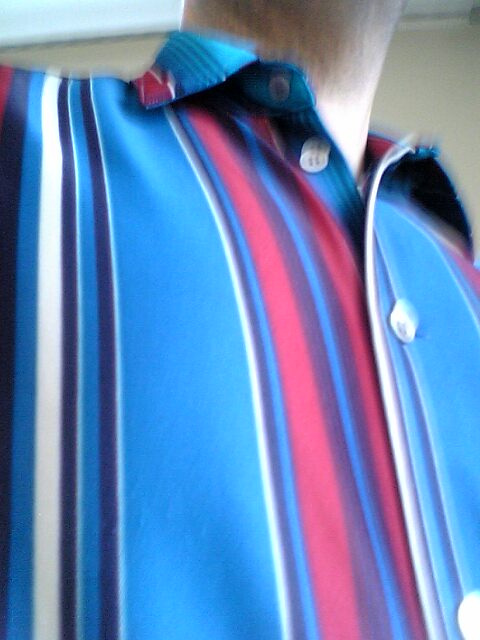
It’s the kind of thing you’d expect, sadly, of a clothes horse in a bubble economy: he buys a the turquoise-est, maroon-est, and black-est striped Yohji Yamamoto shirt he can find. That it cost $675 in 1999 is no surprise. That it’s made of 100% polyester of the kind that litters mid-western thrift shops also raises no eyebrows.
He he wears it proudly on the flight to Salt Lake City to spend that post-IPO Christmas with his family. Somehow, he loves this shirt, even the second when he steps off the plane and realizes that it is his oh-so-Grand Street purchase that has, in fact, returned home; it turns out to be oh-so-indistinguishable from every potbelly-filled, cotton twill, line dancing rodeo shirt coming at him on the concourse. There had been nothing else like it in SoHo, but context was all.
“Dry Clean Only,” the label said, and that’s what he did, religiously. He respects the dry cleaner, cowers a bit, even. Does what he’s told. You want your $675 shirt ruined by your own cheap laziness? I didn’t think so.
It’s 2005, a late autumn night on the road. Sweat’s built up on his shirt–it’s one of two in his bag–but there’s no dry cleaners, and no time to wait until Thursday after 3:00 for pickup even if there was. What to do? He takes a chance and throws the shirt in with the rest of the laundry. It’s late, one mixed load. He’ll take it out to air dry, anyway, how bad could it be? Besides, it’s been months since he’s cleaned the damn thing, late winter/early spring, anyway, before he had to abandon it for the humidifying summer.
The shirt comes out barely wet, safe, fresh, perfect. Nearly as soft as those cashmere sweaters the first time he machine washed them on the advice of the 85-year-old knitter for Vogue Knitting, who, he figured, oughta know. And to think that all these years, he’d been so needlessly cautious sending it to the dry cleaners. All that money, that time, that waiting, that inconvenience, that dependence, for what?
It’s only well into the next day when he remembers he’s made a movie about a dry cleaners, his grandfather’s old dry cleaners, in Utah. The kind of small town place where rodeo shirts get a pressing before the big dance, and where bootcut jeans get a crease so sharp and starch so heavy they don’t hang, but arc like rainbows on the hanger. Is some familial longing somehow transmuted into his reverent care of a shirt? Or has his ironed-on faith in dry cleaning’s infallibility finally started to crack and fade? After waiting decades to buy his own brand of toothpaste, has the man finally broken another enviro-genetically imposed bond?
The euphoria of suddenly discovered self-suffiency hasn’t worn off yet, and until that flares down it’s really too hard to say.
Skip to content
the making of, by greg allen
